Analysis of Business Operations and Management Decisions at Unilever
VerifiedAdded on 2023/06/08
|10
|2546
|486
Report
AI Summary
This report provides an overview of business operations and management, focusing on Unilever as a case study. It explains the main functions of business operations, including accounting, product design, quality control, strategy, and supply chain management, and evaluates Unilever's operational management decisions related to production, supply chain, logistics, location strategies, quality control, and human resources. The report concludes that effective business operations are crucial for organizational success and customer engagement, highlighting Unilever's ability to maintain a loyal customer base through its diverse product offerings and well-managed operations. Desklib provides similar solved assignments for students.
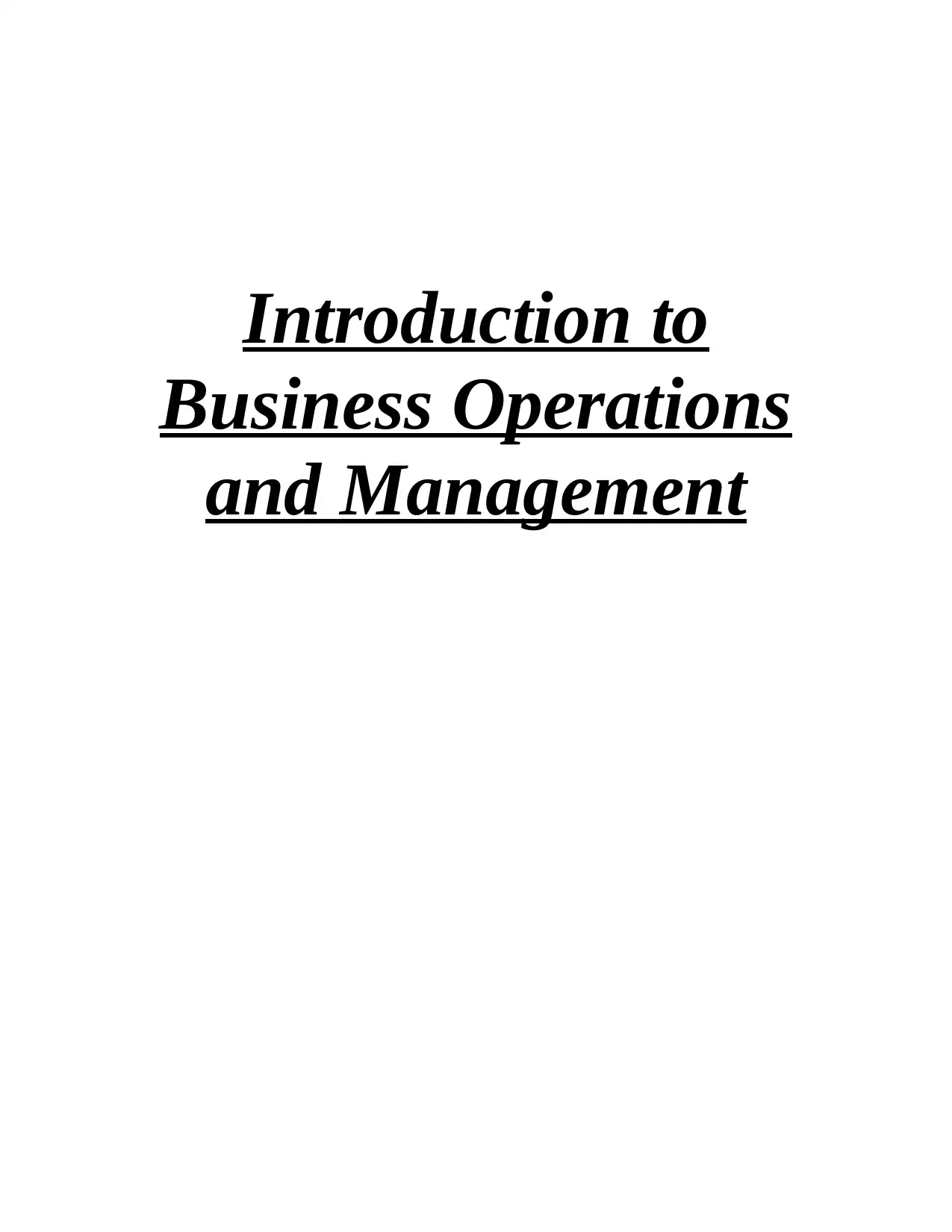
Introduction to
Business Operations
and Management
Business Operations
and Management
Paraphrase This Document
Need a fresh take? Get an instant paraphrase of this document with our AI Paraphraser
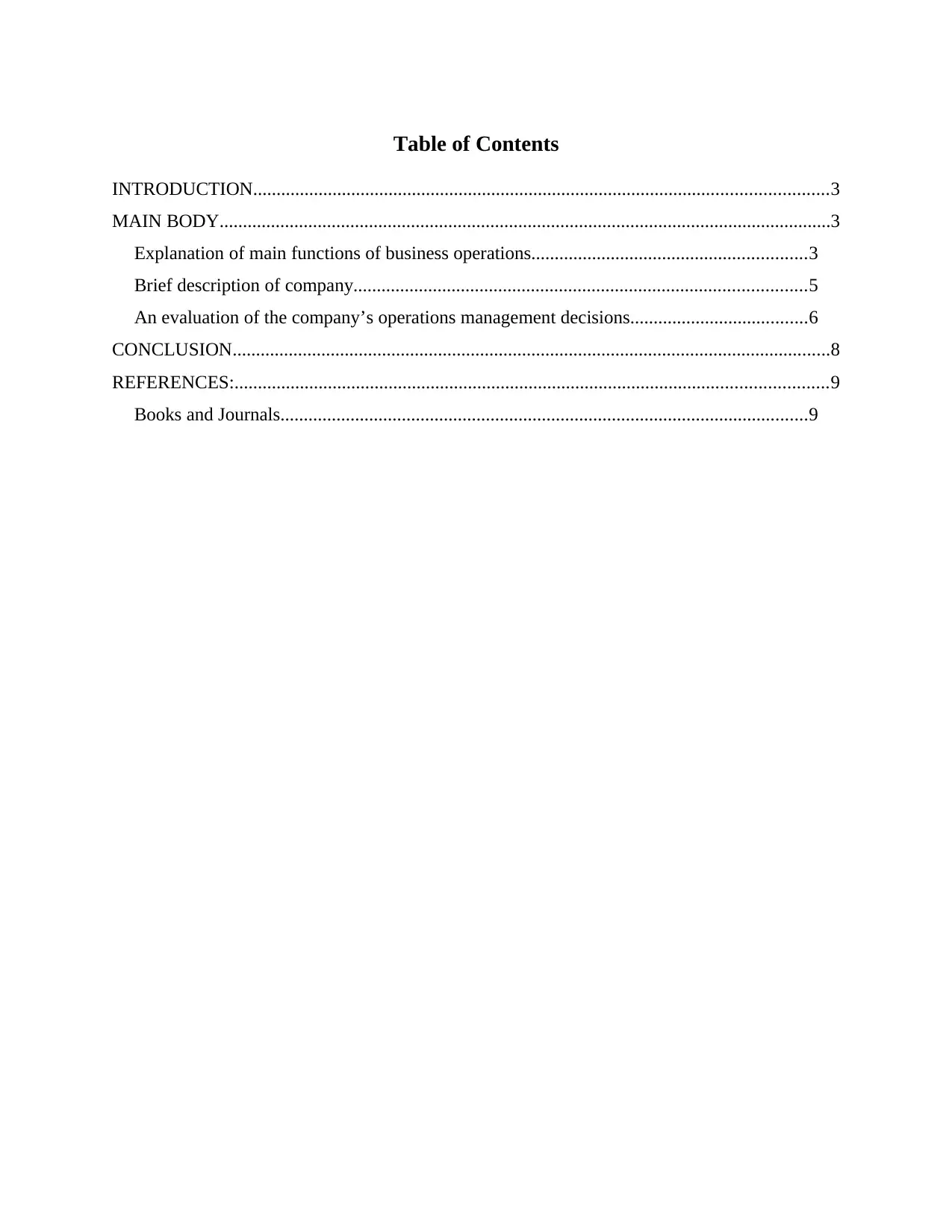
Table of Contents
INTRODUCTION...........................................................................................................................3
MAIN BODY...................................................................................................................................3
Explanation of main functions of business operations...........................................................3
Brief description of company.................................................................................................5
An evaluation of the company’s operations management decisions......................................6
CONCLUSION................................................................................................................................8
REFERENCES:...............................................................................................................................9
Books and Journals.................................................................................................................9
INTRODUCTION...........................................................................................................................3
MAIN BODY...................................................................................................................................3
Explanation of main functions of business operations...........................................................3
Brief description of company.................................................................................................5
An evaluation of the company’s operations management decisions......................................6
CONCLUSION................................................................................................................................8
REFERENCES:...............................................................................................................................9
Books and Journals.................................................................................................................9
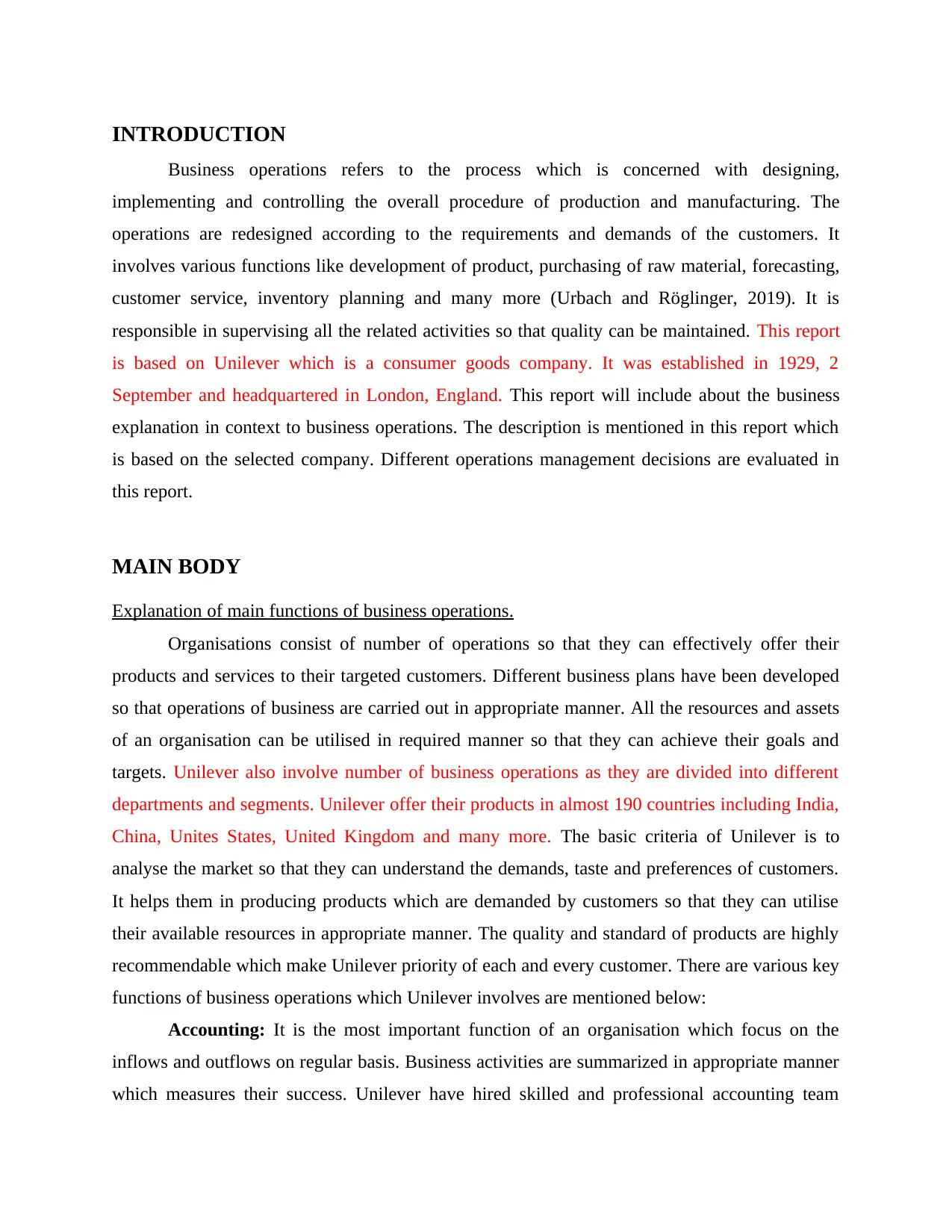
INTRODUCTION
Business operations refers to the process which is concerned with designing,
implementing and controlling the overall procedure of production and manufacturing. The
operations are redesigned according to the requirements and demands of the customers. It
involves various functions like development of product, purchasing of raw material, forecasting,
customer service, inventory planning and many more (Urbach and Röglinger, 2019). It is
responsible in supervising all the related activities so that quality can be maintained. This report
is based on Unilever which is a consumer goods company. It was established in 1929, 2
September and headquartered in London, England. This report will include about the business
explanation in context to business operations. The description is mentioned in this report which
is based on the selected company. Different operations management decisions are evaluated in
this report.
MAIN BODY
Explanation of main functions of business operations.
Organisations consist of number of operations so that they can effectively offer their
products and services to their targeted customers. Different business plans have been developed
so that operations of business are carried out in appropriate manner. All the resources and assets
of an organisation can be utilised in required manner so that they can achieve their goals and
targets. Unilever also involve number of business operations as they are divided into different
departments and segments. Unilever offer their products in almost 190 countries including India,
China, Unites States, United Kingdom and many more. The basic criteria of Unilever is to
analyse the market so that they can understand the demands, taste and preferences of customers.
It helps them in producing products which are demanded by customers so that they can utilise
their available resources in appropriate manner. The quality and standard of products are highly
recommendable which make Unilever priority of each and every customer. There are various key
functions of business operations which Unilever involves are mentioned below:
Accounting: It is the most important function of an organisation which focus on the
inflows and outflows on regular basis. Business activities are summarized in appropriate manner
which measures their success. Unilever have hired skilled and professional accounting team
Business operations refers to the process which is concerned with designing,
implementing and controlling the overall procedure of production and manufacturing. The
operations are redesigned according to the requirements and demands of the customers. It
involves various functions like development of product, purchasing of raw material, forecasting,
customer service, inventory planning and many more (Urbach and Röglinger, 2019). It is
responsible in supervising all the related activities so that quality can be maintained. This report
is based on Unilever which is a consumer goods company. It was established in 1929, 2
September and headquartered in London, England. This report will include about the business
explanation in context to business operations. The description is mentioned in this report which
is based on the selected company. Different operations management decisions are evaluated in
this report.
MAIN BODY
Explanation of main functions of business operations.
Organisations consist of number of operations so that they can effectively offer their
products and services to their targeted customers. Different business plans have been developed
so that operations of business are carried out in appropriate manner. All the resources and assets
of an organisation can be utilised in required manner so that they can achieve their goals and
targets. Unilever also involve number of business operations as they are divided into different
departments and segments. Unilever offer their products in almost 190 countries including India,
China, Unites States, United Kingdom and many more. The basic criteria of Unilever is to
analyse the market so that they can understand the demands, taste and preferences of customers.
It helps them in producing products which are demanded by customers so that they can utilise
their available resources in appropriate manner. The quality and standard of products are highly
recommendable which make Unilever priority of each and every customer. There are various key
functions of business operations which Unilever involves are mentioned below:
Accounting: It is the most important function of an organisation which focus on the
inflows and outflows on regular basis. Business activities are summarized in appropriate manner
which measures their success. Unilever have hired skilled and professional accounting team
⊘ This is a preview!⊘
Do you want full access?
Subscribe today to unlock all pages.

Trusted by 1+ million students worldwide
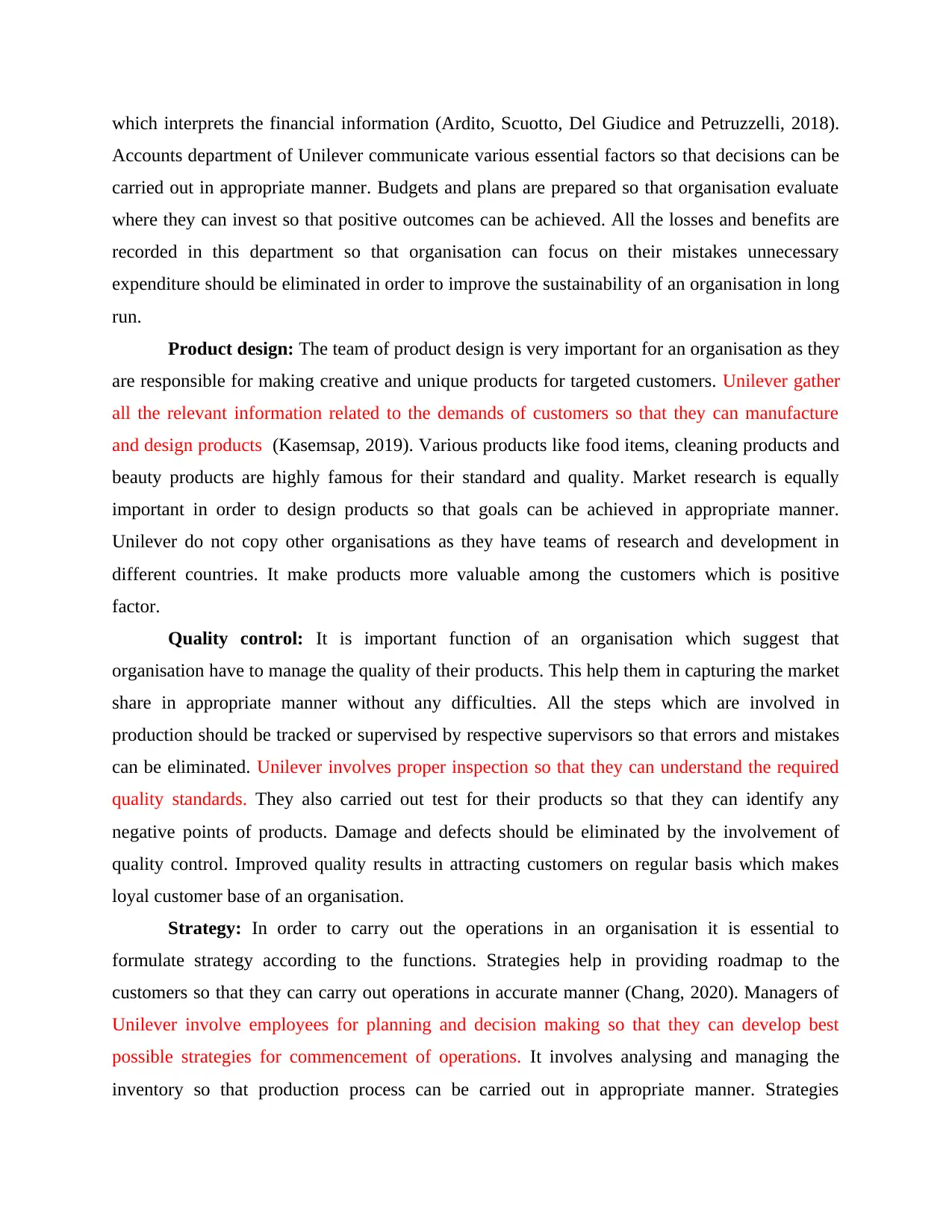
which interprets the financial information (Ardito, Scuotto, Del Giudice and Petruzzelli, 2018).
Accounts department of Unilever communicate various essential factors so that decisions can be
carried out in appropriate manner. Budgets and plans are prepared so that organisation evaluate
where they can invest so that positive outcomes can be achieved. All the losses and benefits are
recorded in this department so that organisation can focus on their mistakes unnecessary
expenditure should be eliminated in order to improve the sustainability of an organisation in long
run.
Product design: The team of product design is very important for an organisation as they
are responsible for making creative and unique products for targeted customers. Unilever gather
all the relevant information related to the demands of customers so that they can manufacture
and design products (Kasemsap, 2019). Various products like food items, cleaning products and
beauty products are highly famous for their standard and quality. Market research is equally
important in order to design products so that goals can be achieved in appropriate manner.
Unilever do not copy other organisations as they have teams of research and development in
different countries. It make products more valuable among the customers which is positive
factor.
Quality control: It is important function of an organisation which suggest that
organisation have to manage the quality of their products. This help them in capturing the market
share in appropriate manner without any difficulties. All the steps which are involved in
production should be tracked or supervised by respective supervisors so that errors and mistakes
can be eliminated. Unilever involves proper inspection so that they can understand the required
quality standards. They also carried out test for their products so that they can identify any
negative points of products. Damage and defects should be eliminated by the involvement of
quality control. Improved quality results in attracting customers on regular basis which makes
loyal customer base of an organisation.
Strategy: In order to carry out the operations in an organisation it is essential to
formulate strategy according to the functions. Strategies help in providing roadmap to the
customers so that they can carry out operations in accurate manner (Chang, 2020). Managers of
Unilever involve employees for planning and decision making so that they can develop best
possible strategies for commencement of operations. It involves analysing and managing the
inventory so that production process can be carried out in appropriate manner. Strategies
Accounts department of Unilever communicate various essential factors so that decisions can be
carried out in appropriate manner. Budgets and plans are prepared so that organisation evaluate
where they can invest so that positive outcomes can be achieved. All the losses and benefits are
recorded in this department so that organisation can focus on their mistakes unnecessary
expenditure should be eliminated in order to improve the sustainability of an organisation in long
run.
Product design: The team of product design is very important for an organisation as they
are responsible for making creative and unique products for targeted customers. Unilever gather
all the relevant information related to the demands of customers so that they can manufacture
and design products (Kasemsap, 2019). Various products like food items, cleaning products and
beauty products are highly famous for their standard and quality. Market research is equally
important in order to design products so that goals can be achieved in appropriate manner.
Unilever do not copy other organisations as they have teams of research and development in
different countries. It make products more valuable among the customers which is positive
factor.
Quality control: It is important function of an organisation which suggest that
organisation have to manage the quality of their products. This help them in capturing the market
share in appropriate manner without any difficulties. All the steps which are involved in
production should be tracked or supervised by respective supervisors so that errors and mistakes
can be eliminated. Unilever involves proper inspection so that they can understand the required
quality standards. They also carried out test for their products so that they can identify any
negative points of products. Damage and defects should be eliminated by the involvement of
quality control. Improved quality results in attracting customers on regular basis which makes
loyal customer base of an organisation.
Strategy: In order to carry out the operations in an organisation it is essential to
formulate strategy according to the functions. Strategies help in providing roadmap to the
customers so that they can carry out operations in accurate manner (Chang, 2020). Managers of
Unilever involve employees for planning and decision making so that they can develop best
possible strategies for commencement of operations. It involves analysing and managing the
inventory so that production process can be carried out in appropriate manner. Strategies
Paraphrase This Document
Need a fresh take? Get an instant paraphrase of this document with our AI Paraphraser
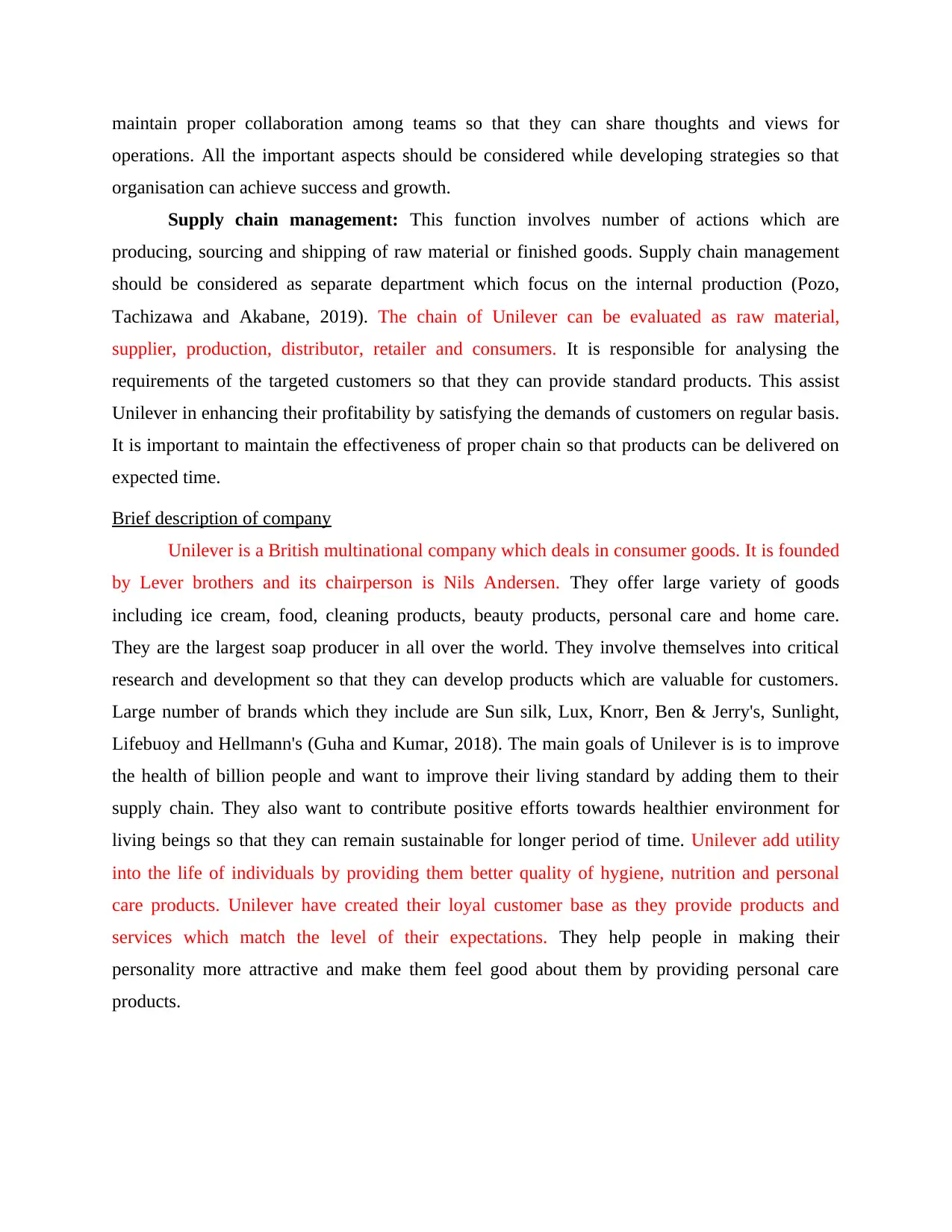
maintain proper collaboration among teams so that they can share thoughts and views for
operations. All the important aspects should be considered while developing strategies so that
organisation can achieve success and growth.
Supply chain management: This function involves number of actions which are
producing, sourcing and shipping of raw material or finished goods. Supply chain management
should be considered as separate department which focus on the internal production (Pozo,
Tachizawa and Akabane, 2019). The chain of Unilever can be evaluated as raw material,
supplier, production, distributor, retailer and consumers. It is responsible for analysing the
requirements of the targeted customers so that they can provide standard products. This assist
Unilever in enhancing their profitability by satisfying the demands of customers on regular basis.
It is important to maintain the effectiveness of proper chain so that products can be delivered on
expected time.
Brief description of company
Unilever is a British multinational company which deals in consumer goods. It is founded
by Lever brothers and its chairperson is Nils Andersen. They offer large variety of goods
including ice cream, food, cleaning products, beauty products, personal care and home care.
They are the largest soap producer in all over the world. They involve themselves into critical
research and development so that they can develop products which are valuable for customers.
Large number of brands which they include are Sun silk, Lux, Knorr, Ben & Jerry's, Sunlight,
Lifebuoy and Hellmann's (Guha and Kumar, 2018). The main goals of Unilever is is to improve
the health of billion people and want to improve their living standard by adding them to their
supply chain. They also want to contribute positive efforts towards healthier environment for
living beings so that they can remain sustainable for longer period of time. Unilever add utility
into the life of individuals by providing them better quality of hygiene, nutrition and personal
care products. Unilever have created their loyal customer base as they provide products and
services which match the level of their expectations. They help people in making their
personality more attractive and make them feel good about them by providing personal care
products.
operations. All the important aspects should be considered while developing strategies so that
organisation can achieve success and growth.
Supply chain management: This function involves number of actions which are
producing, sourcing and shipping of raw material or finished goods. Supply chain management
should be considered as separate department which focus on the internal production (Pozo,
Tachizawa and Akabane, 2019). The chain of Unilever can be evaluated as raw material,
supplier, production, distributor, retailer and consumers. It is responsible for analysing the
requirements of the targeted customers so that they can provide standard products. This assist
Unilever in enhancing their profitability by satisfying the demands of customers on regular basis.
It is important to maintain the effectiveness of proper chain so that products can be delivered on
expected time.
Brief description of company
Unilever is a British multinational company which deals in consumer goods. It is founded
by Lever brothers and its chairperson is Nils Andersen. They offer large variety of goods
including ice cream, food, cleaning products, beauty products, personal care and home care.
They are the largest soap producer in all over the world. They involve themselves into critical
research and development so that they can develop products which are valuable for customers.
Large number of brands which they include are Sun silk, Lux, Knorr, Ben & Jerry's, Sunlight,
Lifebuoy and Hellmann's (Guha and Kumar, 2018). The main goals of Unilever is is to improve
the health of billion people and want to improve their living standard by adding them to their
supply chain. They also want to contribute positive efforts towards healthier environment for
living beings so that they can remain sustainable for longer period of time. Unilever add utility
into the life of individuals by providing them better quality of hygiene, nutrition and personal
care products. Unilever have created their loyal customer base as they provide products and
services which match the level of their expectations. They help people in making their
personality more attractive and make them feel good about them by providing personal care
products.
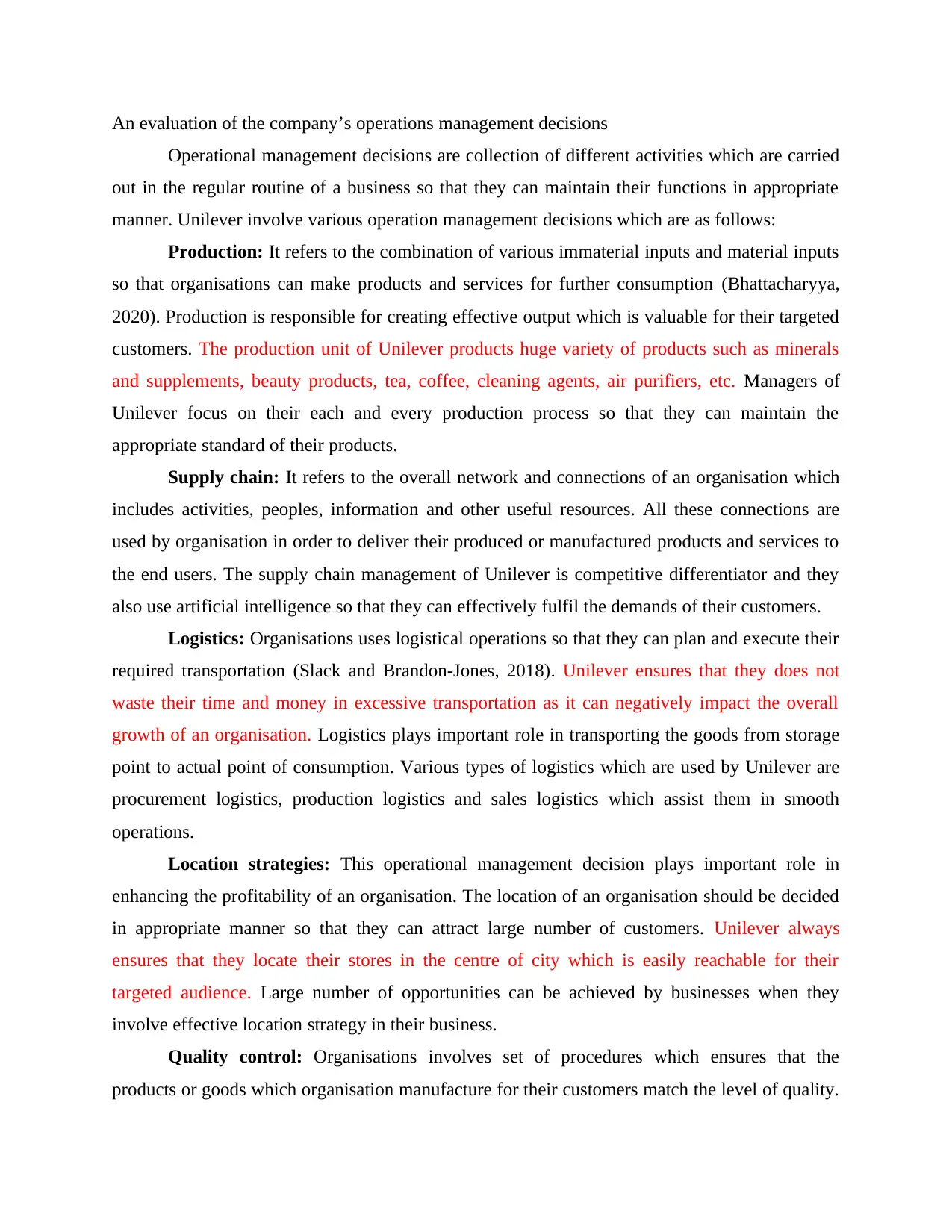
An evaluation of the company’s operations management decisions
Operational management decisions are collection of different activities which are carried
out in the regular routine of a business so that they can maintain their functions in appropriate
manner. Unilever involve various operation management decisions which are as follows:
Production: It refers to the combination of various immaterial inputs and material inputs
so that organisations can make products and services for further consumption (Bhattacharyya,
2020). Production is responsible for creating effective output which is valuable for their targeted
customers. The production unit of Unilever products huge variety of products such as minerals
and supplements, beauty products, tea, coffee, cleaning agents, air purifiers, etc. Managers of
Unilever focus on their each and every production process so that they can maintain the
appropriate standard of their products.
Supply chain: It refers to the overall network and connections of an organisation which
includes activities, peoples, information and other useful resources. All these connections are
used by organisation in order to deliver their produced or manufactured products and services to
the end users. The supply chain management of Unilever is competitive differentiator and they
also use artificial intelligence so that they can effectively fulfil the demands of their customers.
Logistics: Organisations uses logistical operations so that they can plan and execute their
required transportation (Slack and Brandon-Jones, 2018). Unilever ensures that they does not
waste their time and money in excessive transportation as it can negatively impact the overall
growth of an organisation. Logistics plays important role in transporting the goods from storage
point to actual point of consumption. Various types of logistics which are used by Unilever are
procurement logistics, production logistics and sales logistics which assist them in smooth
operations.
Location strategies: This operational management decision plays important role in
enhancing the profitability of an organisation. The location of an organisation should be decided
in appropriate manner so that they can attract large number of customers. Unilever always
ensures that they locate their stores in the centre of city which is easily reachable for their
targeted audience. Large number of opportunities can be achieved by businesses when they
involve effective location strategy in their business.
Quality control: Organisations involves set of procedures which ensures that the
products or goods which organisation manufacture for their customers match the level of quality.
Operational management decisions are collection of different activities which are carried
out in the regular routine of a business so that they can maintain their functions in appropriate
manner. Unilever involve various operation management decisions which are as follows:
Production: It refers to the combination of various immaterial inputs and material inputs
so that organisations can make products and services for further consumption (Bhattacharyya,
2020). Production is responsible for creating effective output which is valuable for their targeted
customers. The production unit of Unilever products huge variety of products such as minerals
and supplements, beauty products, tea, coffee, cleaning agents, air purifiers, etc. Managers of
Unilever focus on their each and every production process so that they can maintain the
appropriate standard of their products.
Supply chain: It refers to the overall network and connections of an organisation which
includes activities, peoples, information and other useful resources. All these connections are
used by organisation in order to deliver their produced or manufactured products and services to
the end users. The supply chain management of Unilever is competitive differentiator and they
also use artificial intelligence so that they can effectively fulfil the demands of their customers.
Logistics: Organisations uses logistical operations so that they can plan and execute their
required transportation (Slack and Brandon-Jones, 2018). Unilever ensures that they does not
waste their time and money in excessive transportation as it can negatively impact the overall
growth of an organisation. Logistics plays important role in transporting the goods from storage
point to actual point of consumption. Various types of logistics which are used by Unilever are
procurement logistics, production logistics and sales logistics which assist them in smooth
operations.
Location strategies: This operational management decision plays important role in
enhancing the profitability of an organisation. The location of an organisation should be decided
in appropriate manner so that they can attract large number of customers. Unilever always
ensures that they locate their stores in the centre of city which is easily reachable for their
targeted audience. Large number of opportunities can be achieved by businesses when they
involve effective location strategy in their business.
Quality control: Organisations involves set of procedures which ensures that the
products or goods which organisation manufacture for their customers match the level of quality.
⊘ This is a preview!⊘
Do you want full access?
Subscribe today to unlock all pages.

Trusted by 1+ million students worldwide
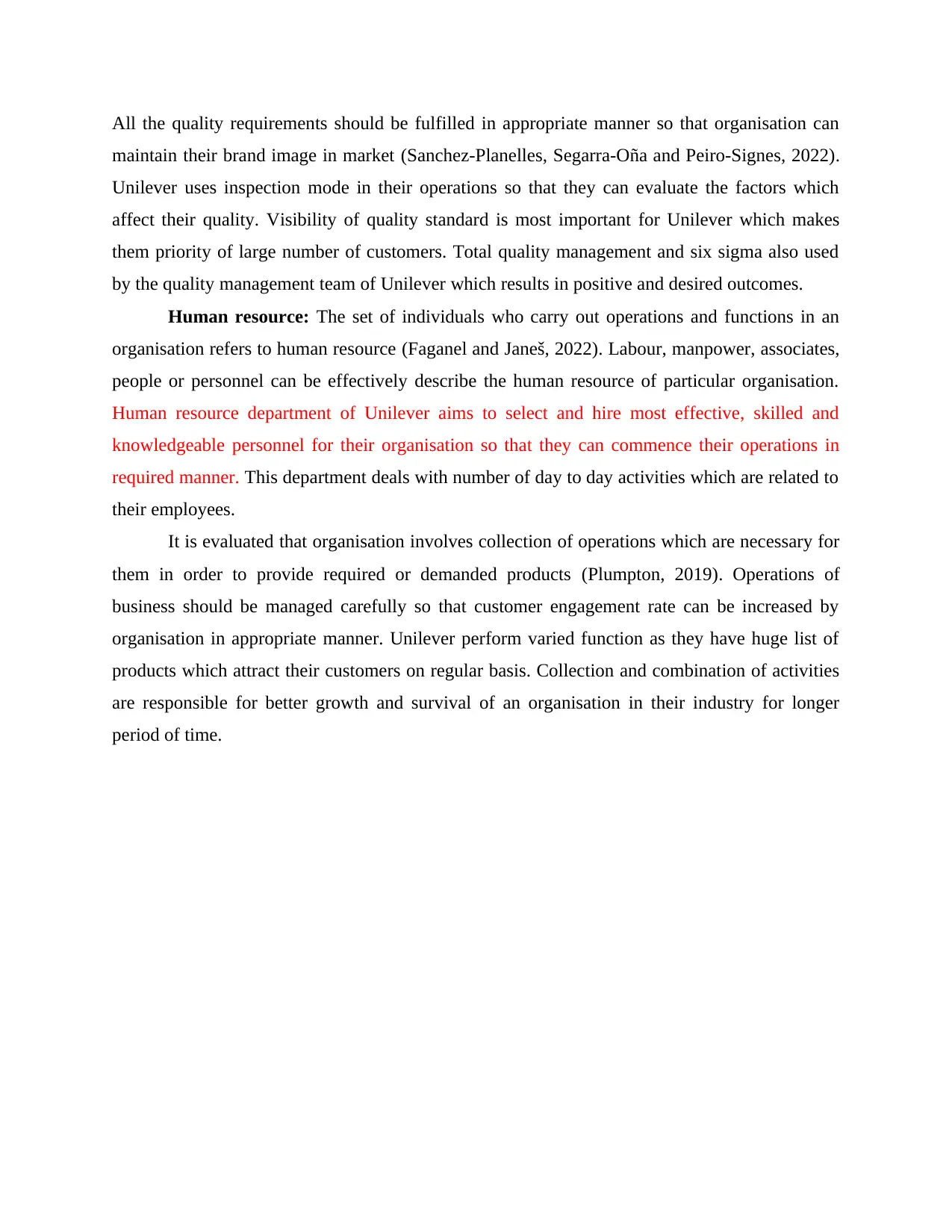
All the quality requirements should be fulfilled in appropriate manner so that organisation can
maintain their brand image in market (Sanchez‐Planelles, Segarra‐Oña and Peiro‐Signes, 2022).
Unilever uses inspection mode in their operations so that they can evaluate the factors which
affect their quality. Visibility of quality standard is most important for Unilever which makes
them priority of large number of customers. Total quality management and six sigma also used
by the quality management team of Unilever which results in positive and desired outcomes.
Human resource: The set of individuals who carry out operations and functions in an
organisation refers to human resource (Faganel and Janeš, 2022). Labour, manpower, associates,
people or personnel can be effectively describe the human resource of particular organisation.
Human resource department of Unilever aims to select and hire most effective, skilled and
knowledgeable personnel for their organisation so that they can commence their operations in
required manner. This department deals with number of day to day activities which are related to
their employees.
It is evaluated that organisation involves collection of operations which are necessary for
them in order to provide required or demanded products (Plumpton, 2019). Operations of
business should be managed carefully so that customer engagement rate can be increased by
organisation in appropriate manner. Unilever perform varied function as they have huge list of
products which attract their customers on regular basis. Collection and combination of activities
are responsible for better growth and survival of an organisation in their industry for longer
period of time.
maintain their brand image in market (Sanchez‐Planelles, Segarra‐Oña and Peiro‐Signes, 2022).
Unilever uses inspection mode in their operations so that they can evaluate the factors which
affect their quality. Visibility of quality standard is most important for Unilever which makes
them priority of large number of customers. Total quality management and six sigma also used
by the quality management team of Unilever which results in positive and desired outcomes.
Human resource: The set of individuals who carry out operations and functions in an
organisation refers to human resource (Faganel and Janeš, 2022). Labour, manpower, associates,
people or personnel can be effectively describe the human resource of particular organisation.
Human resource department of Unilever aims to select and hire most effective, skilled and
knowledgeable personnel for their organisation so that they can commence their operations in
required manner. This department deals with number of day to day activities which are related to
their employees.
It is evaluated that organisation involves collection of operations which are necessary for
them in order to provide required or demanded products (Plumpton, 2019). Operations of
business should be managed carefully so that customer engagement rate can be increased by
organisation in appropriate manner. Unilever perform varied function as they have huge list of
products which attract their customers on regular basis. Collection and combination of activities
are responsible for better growth and survival of an organisation in their industry for longer
period of time.
Paraphrase This Document
Need a fresh take? Get an instant paraphrase of this document with our AI Paraphraser
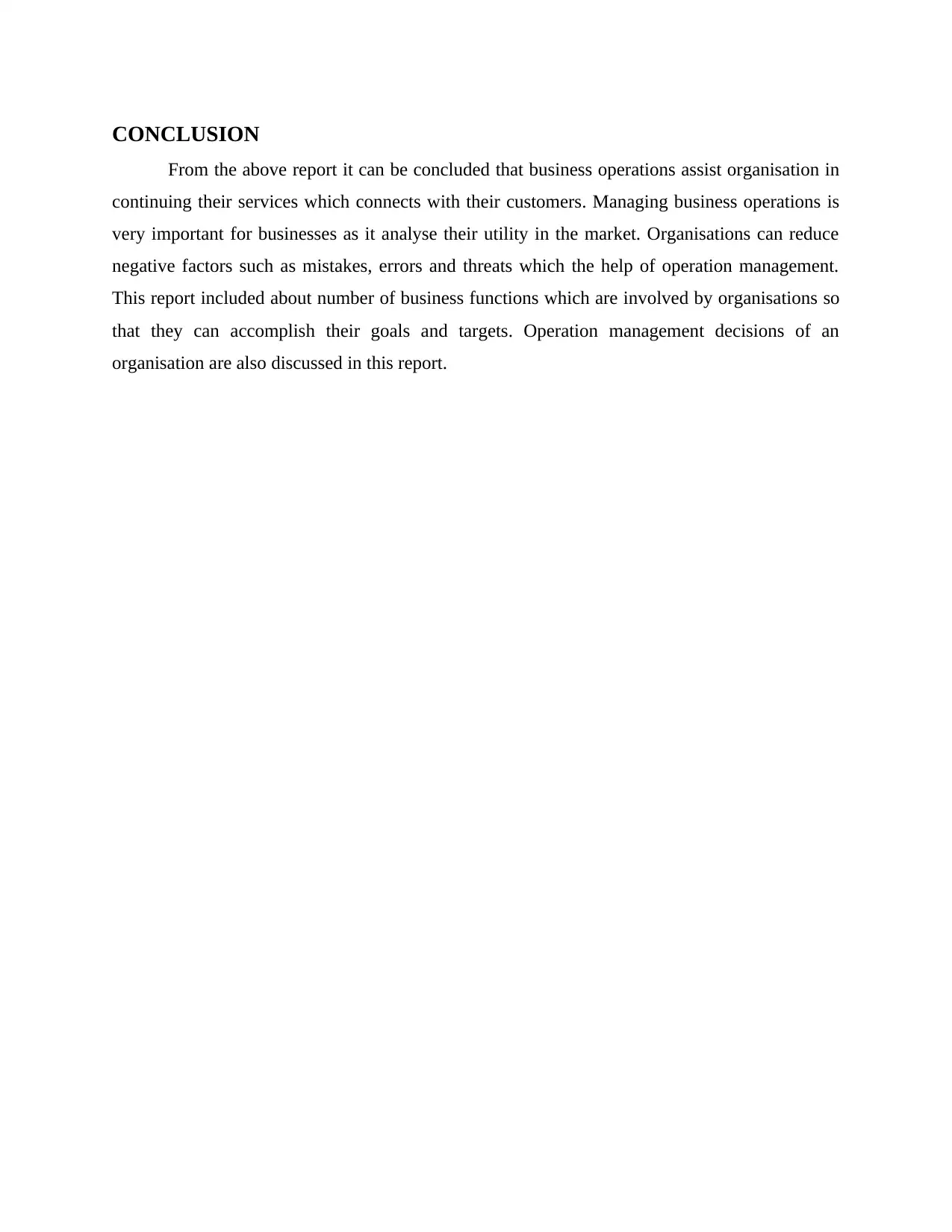
CONCLUSION
From the above report it can be concluded that business operations assist organisation in
continuing their services which connects with their customers. Managing business operations is
very important for businesses as it analyse their utility in the market. Organisations can reduce
negative factors such as mistakes, errors and threats which the help of operation management.
This report included about number of business functions which are involved by organisations so
that they can accomplish their goals and targets. Operation management decisions of an
organisation are also discussed in this report.
From the above report it can be concluded that business operations assist organisation in
continuing their services which connects with their customers. Managing business operations is
very important for businesses as it analyse their utility in the market. Organisations can reduce
negative factors such as mistakes, errors and threats which the help of operation management.
This report included about number of business functions which are involved by organisations so
that they can accomplish their goals and targets. Operation management decisions of an
organisation are also discussed in this report.
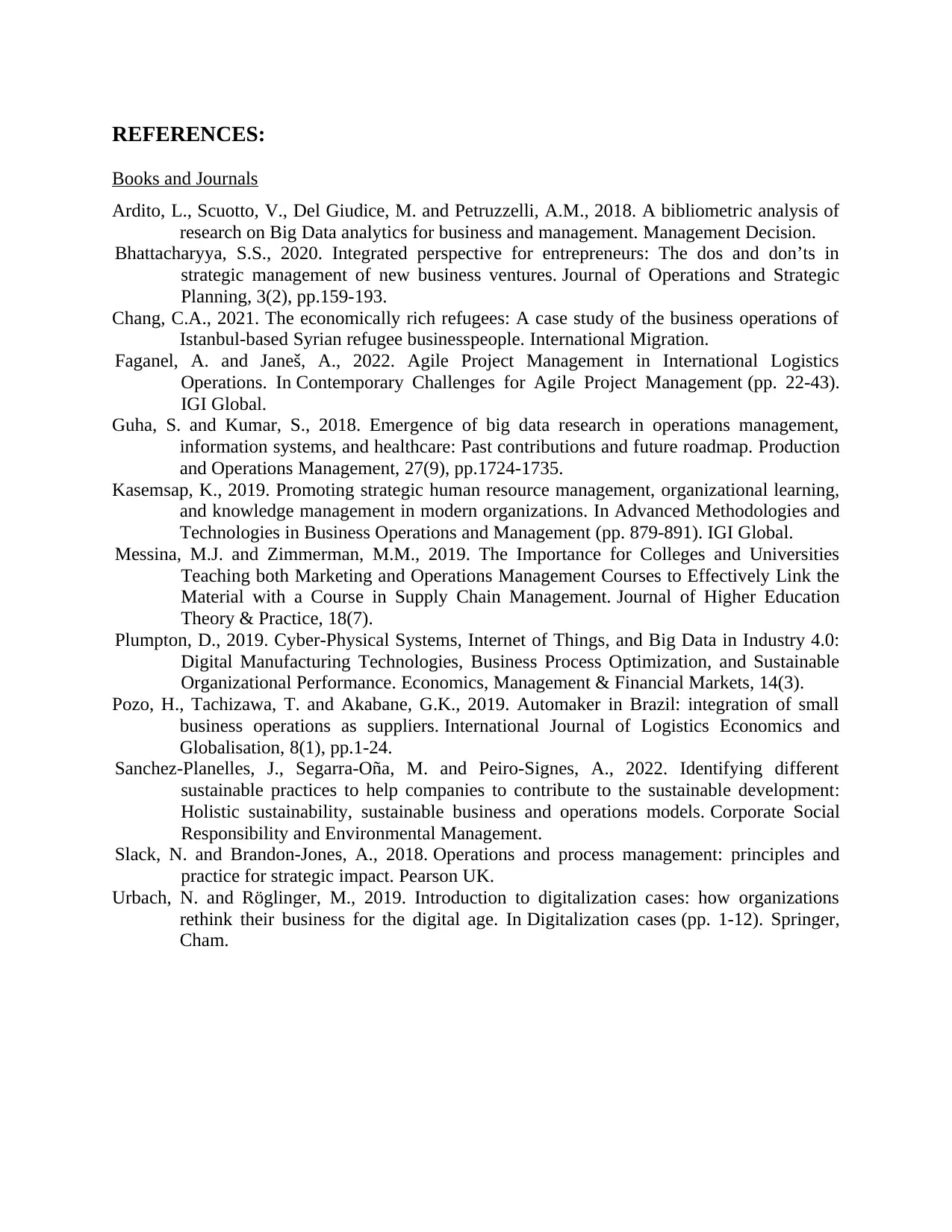
REFERENCES:
Books and Journals
Ardito, L., Scuotto, V., Del Giudice, M. and Petruzzelli, A.M., 2018. A bibliometric analysis of
research on Big Data analytics for business and management. Management Decision.
Bhattacharyya, S.S., 2020. Integrated perspective for entrepreneurs: The dos and don’ts in
strategic management of new business ventures. Journal of Operations and Strategic
Planning, 3(2), pp.159-193.
Chang, C.A., 2021. The economically rich refugees: A case study of the business operations of
Istanbul‐based Syrian refugee businesspeople. International Migration.
Faganel, A. and Janeš, A., 2022. Agile Project Management in International Logistics
Operations. In Contemporary Challenges for Agile Project Management (pp. 22-43).
IGI Global.
Guha, S. and Kumar, S., 2018. Emergence of big data research in operations management,
information systems, and healthcare: Past contributions and future roadmap. Production
and Operations Management, 27(9), pp.1724-1735.
Kasemsap, K., 2019. Promoting strategic human resource management, organizational learning,
and knowledge management in modern organizations. In Advanced Methodologies and
Technologies in Business Operations and Management (pp. 879-891). IGI Global.
Messina, M.J. and Zimmerman, M.M., 2019. The Importance for Colleges and Universities
Teaching both Marketing and Operations Management Courses to Effectively Link the
Material with a Course in Supply Chain Management. Journal of Higher Education
Theory & Practice, 18(7).
Plumpton, D., 2019. Cyber-Physical Systems, Internet of Things, and Big Data in Industry 4.0:
Digital Manufacturing Technologies, Business Process Optimization, and Sustainable
Organizational Performance. Economics, Management & Financial Markets, 14(3).
Pozo, H., Tachizawa, T. and Akabane, G.K., 2019. Automaker in Brazil: integration of small
business operations as suppliers. International Journal of Logistics Economics and
Globalisation, 8(1), pp.1-24.
Sanchez‐Planelles, J., Segarra‐Oña, M. and Peiro‐Signes, A., 2022. Identifying different
sustainable practices to help companies to contribute to the sustainable development:
Holistic sustainability, sustainable business and operations models. Corporate Social
Responsibility and Environmental Management.
Slack, N. and Brandon-Jones, A., 2018. Operations and process management: principles and
practice for strategic impact. Pearson UK.
Urbach, N. and Röglinger, M., 2019. Introduction to digitalization cases: how organizations
rethink their business for the digital age. In Digitalization cases (pp. 1-12). Springer,
Cham.
Books and Journals
Ardito, L., Scuotto, V., Del Giudice, M. and Petruzzelli, A.M., 2018. A bibliometric analysis of
research on Big Data analytics for business and management. Management Decision.
Bhattacharyya, S.S., 2020. Integrated perspective for entrepreneurs: The dos and don’ts in
strategic management of new business ventures. Journal of Operations and Strategic
Planning, 3(2), pp.159-193.
Chang, C.A., 2021. The economically rich refugees: A case study of the business operations of
Istanbul‐based Syrian refugee businesspeople. International Migration.
Faganel, A. and Janeš, A., 2022. Agile Project Management in International Logistics
Operations. In Contemporary Challenges for Agile Project Management (pp. 22-43).
IGI Global.
Guha, S. and Kumar, S., 2018. Emergence of big data research in operations management,
information systems, and healthcare: Past contributions and future roadmap. Production
and Operations Management, 27(9), pp.1724-1735.
Kasemsap, K., 2019. Promoting strategic human resource management, organizational learning,
and knowledge management in modern organizations. In Advanced Methodologies and
Technologies in Business Operations and Management (pp. 879-891). IGI Global.
Messina, M.J. and Zimmerman, M.M., 2019. The Importance for Colleges and Universities
Teaching both Marketing and Operations Management Courses to Effectively Link the
Material with a Course in Supply Chain Management. Journal of Higher Education
Theory & Practice, 18(7).
Plumpton, D., 2019. Cyber-Physical Systems, Internet of Things, and Big Data in Industry 4.0:
Digital Manufacturing Technologies, Business Process Optimization, and Sustainable
Organizational Performance. Economics, Management & Financial Markets, 14(3).
Pozo, H., Tachizawa, T. and Akabane, G.K., 2019. Automaker in Brazil: integration of small
business operations as suppliers. International Journal of Logistics Economics and
Globalisation, 8(1), pp.1-24.
Sanchez‐Planelles, J., Segarra‐Oña, M. and Peiro‐Signes, A., 2022. Identifying different
sustainable practices to help companies to contribute to the sustainable development:
Holistic sustainability, sustainable business and operations models. Corporate Social
Responsibility and Environmental Management.
Slack, N. and Brandon-Jones, A., 2018. Operations and process management: principles and
practice for strategic impact. Pearson UK.
Urbach, N. and Röglinger, M., 2019. Introduction to digitalization cases: how organizations
rethink their business for the digital age. In Digitalization cases (pp. 1-12). Springer,
Cham.
⊘ This is a preview!⊘
Do you want full access?
Subscribe today to unlock all pages.

Trusted by 1+ million students worldwide

1 out of 10
Related Documents
Your All-in-One AI-Powered Toolkit for Academic Success.
+13062052269
info@desklib.com
Available 24*7 on WhatsApp / Email
![[object Object]](/_next/static/media/star-bottom.7253800d.svg)
Unlock your academic potential
Copyright © 2020–2025 A2Z Services. All Rights Reserved. Developed and managed by ZUCOL.




